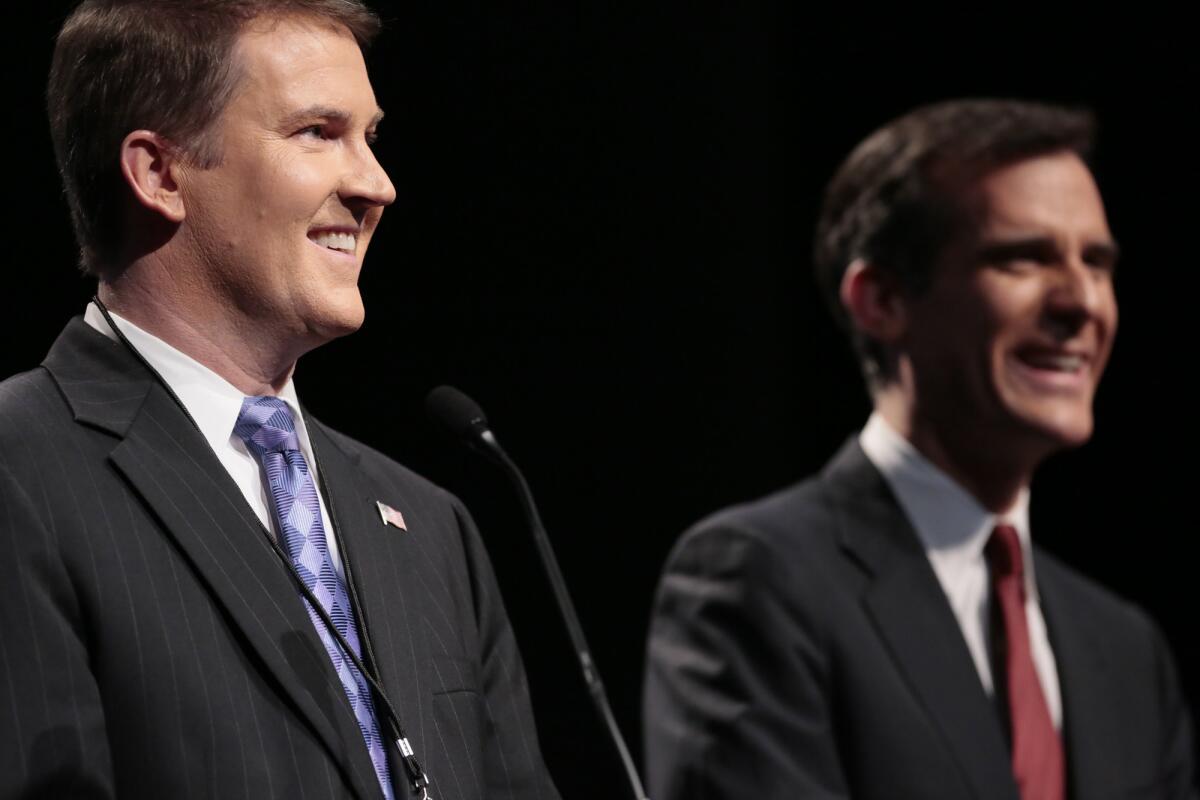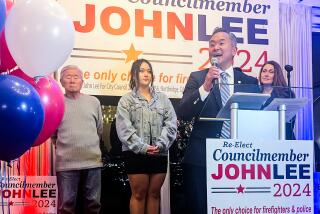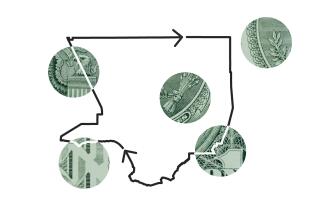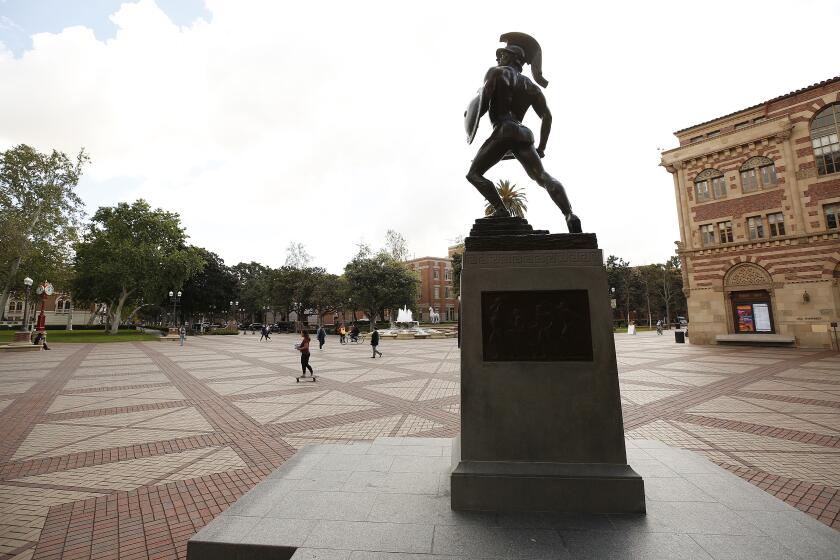Newton: In L.A. politics, money still talks

Money is a measure of political viability. Those candidates seen as having potential attract it; those seen as long shots struggle to fill their campaign coffers. And with money, once you’ve raised some, it’s a lot easier to raise more. In the money race among the mayoral candidates, Councilman Eric Garcetti and Controller Wendy Greuel are in one league, Councilwoman Jan Perry trails significantly, and lawyer Kevin James is a far-distant fourth.
You might think that those numbers would speak for themselves, but I was reminded recently that candidates are usually able to extract arguments from fundraising reports about how the numbers favor them.
Garcetti leads in money raised, something he sees (not surprisingly) as proof of his broad support and appeal. Moreover, he boasts that 70% of his donors have never before contributed to a city campaign, a fundraising feat Garcetti likens to Barack Obama’s 2008 presidential effort. (He makes that comparison almost as often as Greuel reminds voters she once worked for Mayor Tom Bradley.)
JIM NEWTON: The L.A. mayor’s race
Greuel concedes that she trails Garcetti by a smidgen — he’s raised $3.68 million in contributions, she $3.6 million. But she argues that it’s easier for Garcetti to raise money because he’s still a city councilman. Donors, she says, have an incentive to give to him in hopes that doing so will help them gain favor on projects or issues that come before the council. As for her own numbers, Greuel says: “I’m more than pleasantly surprised.”
One interesting aspect of the money race so far is that dozens of donors have given to both the Garcetti and the Greuel campaigns. The same lawyers, developers, home builders and businesspeople of all types show up throughout their reports: There’s a Brooklyn-based consultant, a lawyer from Cypress, the founder of something called Bad Robot Productions. The list goes on and on, with many giving the maximum of $1,300 to both. Partly that’s because the two are similar enough politically that they have an overlapping base of support, and partly it’s because for some donors, giving is business, and they want to hedge their bets.
Perry, meanwhile, admits that she’d like to be doing better; one of her most appealing qualities is a willingness to admit that not everything is going perfectly. But for Perry, whose last report said she’d raised $1.48 million, the relevant issue is the city’s spending limit, which caps expenditures at $2.7 million for the March election and $2.2 million for the May runoff (assuming no candidate gets more than 50% of the vote in the first round). If the candidates stay within that limit — anyone who blows through it opens the gates for the others to follow — Perry is confident she can keep pace. As they say in court, if you can’t argue the facts, argue the law.
VIDEO: Interviews with L.A.’s mayoral candidates
For James, the issue is a little more complicated. He hasn’t shown the ability to raise much on his own — his latest fundraising report records just $332,000 in contributions, and he’s spent far more than that. He’s counting on a Republican “super PAC” to run an independent campaign on his behalf.
The trick for James is that to excite conservative donors into giving to the super PAC, he needs to convince them he offers something worth supporting. That’s complicated because to have a shot at winning a Los Angeles election, he needs to demonstrate he’s a moderate, which isn’t likely to attract much Republican money.
To his credit, James so far has opted not to bend to money. He is an openly gay man who supports gun control and same-sex marriage. He’s lately softened his once hard-line stance on immigration. Moreover, he makes no apologies for his moderate social views and insists he will not tailor his message to gin up financial support. “We’re 50 days out,” he told me in a Century City coffee shop two weeks ago. “Wouldn’t you have heard that by now?”
As of the most recent filings, nearly $64,000 in independent expenditures has been spent on James’ behalf — helpful but a relative pittance in this campaign.
He won’t be the only one to rely on outside help. Hollywood executives and the union that dominates the city’s Department of Water and Power are joining forces to elect their favorites. That union, the IBEW, has been in Greuel’s corner before, so it won’t be long before ads denouncing Garcetti and the rest will begin appearing.
That will cut two ways, spreading Greuel’s message yet also opening her to charges that she’s a creature of city unions. Indeed, setting the spin aside, money always comes at a cost: Even as it makes candidates viable, it opens them to questions. This race is no exception.
Still, for all of the cross-cutting influences that money brings, here’s a fact to remember: In only one recent campaign did the losing candidate (Antonio Villaraigosa in 2001, in his first race against James Hahn) out-raise the winner, and then only by $59,000. Four of the last five Los Angeles mayoral elections have gone to the candidate who spent the most money.
Coming Friday: The mayor’s race — strategy
More to Read
A cure for the common opinion
Get thought-provoking perspectives with our weekly newsletter.
You may occasionally receive promotional content from the Los Angeles Times.











